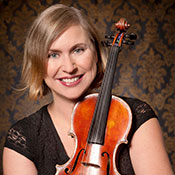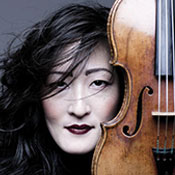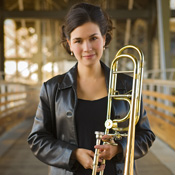
Assistant principal second violinist Tim Klabunde steps into the spotlight for Vivaldi’s The Four Seasons
David Lewellen
PUBLISHED
Tagged Under: 2018.19 Season, MSO Musicians, Musician, Violin
Tim Klabunde is used to reacting to other musicians’ decisions about style. Later this spring, he’ll get to make his own.
Klabunde, the MSO’s assistant principal second violin, will be one of four titled violinists performing Vivaldi’s The Four Seasons with the MSO in the Basilica of St. Josaphat. Klabunde will play the “Autumn” concerto, and “I’ve already changed my mind about some things,” he said, on which the orchestra will have to follow him. “But it’ll save a lot of time at rehearsal.”
He has played all four concertos at various times in his career, and as repertory staples, “every violinist knows what the options are to give it some variety,” he said. The written melody can be considered “more of an outline for the player to improvise.”
The “Autumn” concerto evokes a deer hunt and a harvest dance, with lots of drinking and sleeping depicted through rubato, or small variations of tempo within a measure. “Anyone who’s tapping their foot should have a hard time,” Klabunde joked.
As a front-row player, and as the section leader when principal Jennifer Startt is away, he is responsible for making sure that the second violins match the rest of the string section in bowing and style. Much of that work happens before the first rehearsal, checking the conductor’s and concertmaster’s marking of the score and parts and making sure that the other second violins’ parts have the same markings. “We want to move musically like a school of fish,” he said.
“Tim is my anchor,” Startt said. “We lock in and we don’t have to think about it. He’s super solid; he doesn’t waver. And he’s really funny. Our senses of humor get along with each other. He can make a bad day better.”
Second violins “move between playing with the first violins in melodic things and playing with the violas and cellos in a supporting role,” Klabunde said. “And it changes, often within the same piece. So you have to be aware of that, so that when you do get the melodic moments, you match.”
In rehearsal and performance, body language can help convey the necessary approach or sound. “This year especially, the first violins and violas have often told me that the second violins sound great,” Klabunde said. “It’s really exciting to be in the middle of it.”
A lifelong Milwaukeean, Klabunde went to Milwaukee Public Schools and studied violin at UW-Milwaukee, “with the older generation of the Fine Arts Quartet,” the ensemble that was in residence at the university for decades. “They helped me develop skills I needed to play in an orchestra, like listening and awareness.” He was a substitute violin in the MSO for four seasons before winning a full-time second violin job in 1980, near the end of Kenneth Schermerhorn’s tenure as music director. Klabunde moved to the first violin section in 1996, and then was named assistant principal second in 2009.
Klabunde has also done plenty of outside playing, performing church gigs and recording work as well as spending ten seasons with the Prometheus Trio, whose other members are MSO cellist Scott Tisdel and substitute pianist Stefanie Jacob. “That was just fantastic,” he said. “It was like walking into a library and finding a whole room you never knew about.”
Until last season, he was a regular at the summer Washington Island Music Festival, which features many MSO musicians. But, he said, “I have grandchildren now. I balance my time a bit differently.” Washington Island was a chance to do a lot of fishing, and coming to rehearsal with fishing-rod hands was an occupational hazard. He and his wife, Mary Ann, enjoy traveling to other destinations in the United States and Canada when they are not at home in Fox Point.
He is also a fan of rock and heavy metal music (he thinks many orchestral musicians are), and he is known backstage as a connoisseur of dark chocolate. “You have one square of that at intermission,” he says, “and you can taste it the whole second half.”



